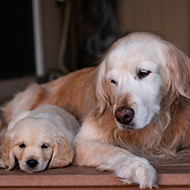Princeton study explores canine ageing

"This will be one of the largest genetic datasets ever produced for dogs" - Professor Joshua Akey, co-lead of genetics analyses.
Researchers at Princeton University are leading the genetics work on a project exploring canine ageing.
Founded in 2018, the 'Dog Aging Project' (DAP) studies tens of thousands of dogs over the course of their life to develop a comprehensive understanding of how dogs age, taking into account size, breed and background.
The open-source dataset that will be created from the DAP will give veterinary surgeons and scientists the tools to evaluate how well a particular dog is ageing.
Anticipated to run for at least 10 years, the DAP will sequence the genomes of 10,000 dogs, and over 32,000 dogs have already joined the 'DAP Pack'.
Upon enrolling their dog into the Pack, the dogs' owners agree to fill out annual surveys and take measurements of their dogs over the course of the project. Some of the owners will be asked to collect cheek swabs for DNA sampling, and the DAP researchers work with veterinary surgeons across the country to submit fur, faecal, urine and blood samples for certain dogs.
Joshua Akey, a member of the DAP's research team, and professor at Princeton's Lewis-Sigler Institute for Integrative Genomics, discussed the project: “This is a very large, ambitious, wildly interdisciplinary project that has the potential to be a powerful resource for the broader scientific community.
“Personally, I find this project exciting because I think it will improve dog, and ultimately, human health.”
Akey explained the project's significance: “This will be one of the largest genetics datasets ever produced for dogs, and it will be a powerful resource not only to understand the role of genetics in aging, but also to answer more fundamental questions about the evolutionary history and domestication of dogs.
“One part of the project that I am super excited about is a ‘super-centenarian’ study, comparing the DNA of exceptionally long-lived dogs to dogs that live to the average age for their breed.
“This is the first study of its kind in dogs (to my knowledge), and I think it’s a clever way of trying to find genetic differences that contribute to exceptional longevity.”
The researchers hope to open the large, fully-anonymised dataset within the next few months, allowing researchers from different fields to contribute to the study in many different ways.



 The Veterinary Medicines Directorate (VMD) is inviting applications from veterinary students to attend a one-week extramural studies (EMS) placement in July 2026.
The Veterinary Medicines Directorate (VMD) is inviting applications from veterinary students to attend a one-week extramural studies (EMS) placement in July 2026.